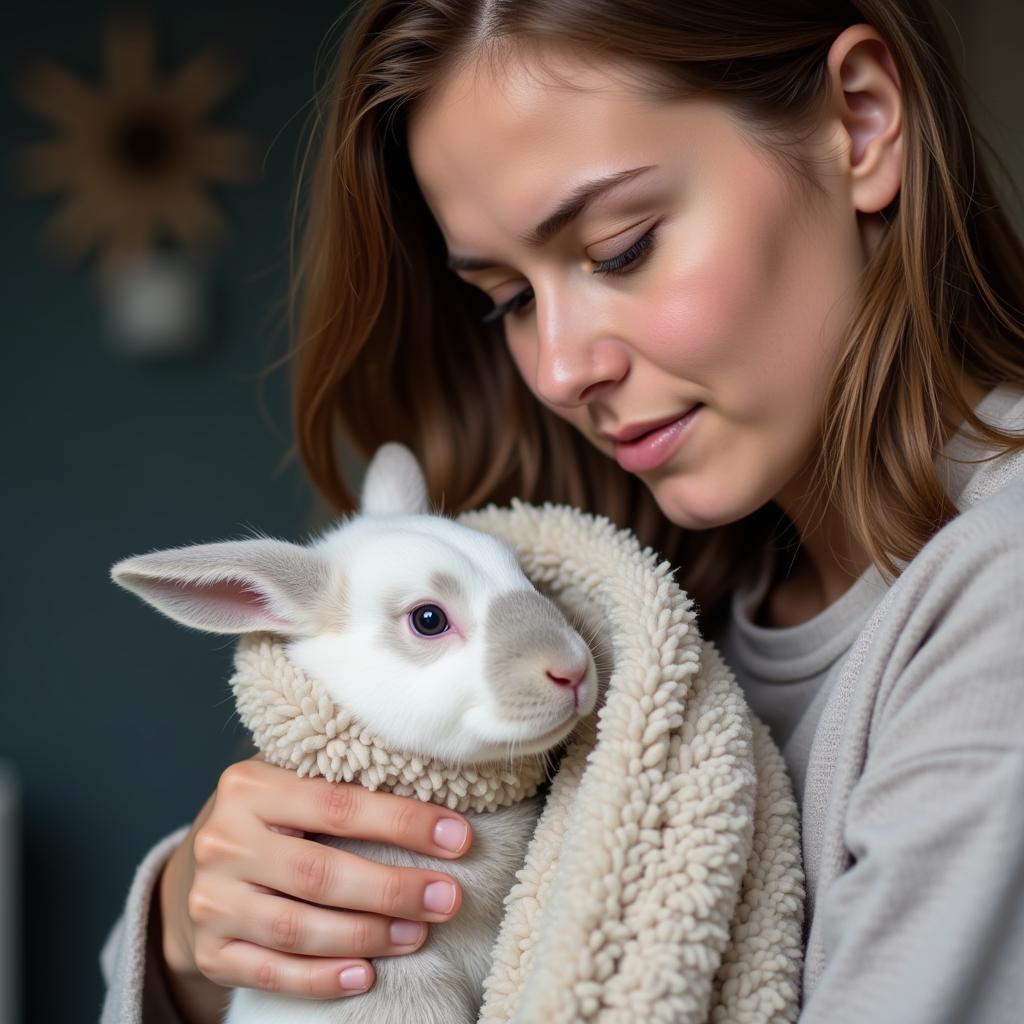Rabbit Dying is a heartbreaking experience for any owner. Understanding the reasons why rabbits die, recognizing the signs of illness, and knowing how to cope with the loss are crucial aspects of responsible rabbit ownership. This guide will delve into these sensitive topics, offering support and practical advice for dealing with the passing of a beloved pet rabbit.
Why Do Rabbits Die?
Rabbits, like all living creatures, have a lifespan. Domestic rabbits typically live for 8-12 years, though some breeds may live longer or shorter. Several factors contribute to a rabbit’s lifespan and can lead to premature death.
Common Causes of Death in Rabbits
- Disease: Infectious diseases, such as myxomatosis and viral hemorrhagic disease (VHD), are significant threats to rabbit populations and can be fatal. Other diseases like respiratory infections, GI stasis, and dental disease can also lead to death if left untreated.
- Injury: Rabbits are fragile animals and can be easily injured. Falls, attacks by predators, and even improper handling can cause serious injuries that can prove fatal.
- Improper Diet: A diet lacking in hay and high in processed foods can lead to digestive problems and other health issues, ultimately shortening a rabbit’s life.
- Stress: Environmental stressors, such as extreme temperatures, loud noises, and overcrowding, can weaken a rabbit’s immune system and make them more susceptible to illness.
- Old Age: As rabbits age, their organs begin to fail, making them more vulnerable to disease and other health complications.
Recognizing the Signs of a Dying Rabbit
It’s important to be aware of the signs that your rabbit may be nearing the end of its life. Recognizing these signs can help you prepare emotionally and ensure your rabbit’s comfort in its final days.
Common Signs of Impending Death
- Loss of Appetite: A significant decrease or complete loss of interest in food and water is often a sign that a rabbit’s body is shutting down.
- Lethargy and Weakness: A dying rabbit will become increasingly weak and lethargic, spending most of its time resting and showing little interest in its surroundings.
- Changes in Breathing: Rapid, shallow breathing or labored breathing can indicate respiratory distress.
- Decreased Body Temperature: As the body begins to shut down, a rabbit’s body temperature will drop. Their ears and paws may feel cool to the touch.
- Changes in Behavior: A typically social rabbit may become withdrawn and uninterested in interaction.
Coping with the Loss of a Rabbit
Losing a pet rabbit is devastating. Allow yourself time to grieve and process your emotions.
Dealing with Grief
- Acknowledge your feelings: Don’t suppress your grief. Allow yourself to cry, talk about your rabbit, and remember the good times.
- Seek support: Talk to friends, family, or other rabbit owners who understand what you’re going through.
- Memorialize your rabbit: Create a memorial for your rabbit, such as a photo album, a special place in your garden, or a piece of artwork.
“Losing a pet is like losing a member of the family,” says Dr. Emily Carter, DVM, specializing in exotic animal care. “The grief is real and valid. Don’t be afraid to seek professional help if you’re struggling to cope.”
 Coping With Rabbit Loss
Coping With Rabbit Loss
Conclusion
Rabbit dying is a painful but inevitable part of pet ownership. Understanding the reasons why rabbits die, recognizing the signs, and knowing how to cope with the loss can help you provide the best possible care for your rabbit throughout its life and prepare you for the difficult time when it’s gone. Remember, the love and companionship you shared with your rabbit will always hold a special place in your heart.
FAQ
-
What is the average lifespan of a domestic rabbit?
- Domestic rabbits typically live for 8-12 years.
-
What are the most common diseases that can cause rabbit death?
- Myxomatosis, VHD, respiratory infections, GI stasis, and dental disease are common causes.
-
How can I tell if my rabbit is dying?
- Look for signs like loss of appetite, lethargy, changes in breathing, decreased body temperature, and behavioral changes.
-
What should I do if I think my rabbit is dying?
- Contact a veterinarian immediately for guidance and support.
-
How can I cope with the loss of my rabbit?
- Allow yourself to grieve, seek support from others, and memorialize your pet.
-
Can stress contribute to a rabbit’s death?
- Yes, stress can weaken a rabbit’s immune system and make them more susceptible to illness.
-
What is the best way to prevent my rabbit from dying prematurely?
- Provide proper care, including a healthy diet, a safe environment, and regular veterinary checkups.
Common Scenarios & Questions
- Sudden Death: What should I do if my rabbit dies suddenly? It’s crucial to consult a veterinarian to determine the cause of death, especially if you have other rabbits.
- Euthanasia: When is it time to consider euthanasia for my rabbit? If your rabbit is suffering from a terminal illness or experiencing untreatable pain, euthanasia may be the most humane option. Discuss this difficult decision with your veterinarian.
Further Resources
For more information on rabbit health and care, please visit our other articles on rabbit nutrition and common rabbit diseases.
Need support? Please contact us: Phone: 0902476650, Email: [email protected] or visit us at 139 Đ. Võ Văn Kiệt, Hoà Long, Bà Rịa, Bà Rịa – Vũng Tàu, Việt Nam. We have a 24/7 customer support team.





